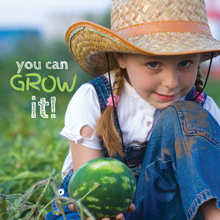Getting kids to eat more fruits and veggies can be challenging, but research shows that when kids help grow fruits and vegetables, they are more likely to eat more produce and try different kinds, too. Not only that, but gardening also provides a host of learning experiences that are good for little growing minds and bodies.
Here are just a few of the benefits of gardening with your kids:
Gardening Encourages Healthy Eating
- kids are more interested in trying the different fruits and veggies that they’ve had a hand in growing
- they are more open to tasting different types of food
- reinforcing healthy eating habits at a young age will help them make better food choices as they grow older
Engages the Senses and Promotes Responsibility and Patience
- digging in the dirt, sorting through seeds, and handling the plants piques their curiosity about the smells and textures of the earth
- caring for plants by watering, weeding, and fertilizing helps encourage responsibility
- in our instant-gratification digital age, gardening teaches children that they must practice patience while their plants to grow
Teaches New Skills
- kids will learn about cause and effect by seeing what happens if the plant doesn’t get enough water or sunlight
- helps to refine their motor skills when they use spades, rakes, or other tools, place small seeds in soil, and pour water
- they are introduced to basic scientific concepts of botany, biology, and chemistry
- they can practice their math skills by measuring growth or counting the number of petals on a flower or beans on a stalk
Provides Time Outdoors
- gardening is a great way to get kids out of the house, away from their screens, and engage in an activity the whole family can participate in
- carrying pots, soil, and watering cans, pushing a wheelbarrow, and digging or raking can provide the physical activity kids need
- research has shown that these types of activities—known as “heavy work”—can even help kids stay calm and focused
Here are some quick tips to get your kids out into the garden:
Start Small and Keep it Simple
- a small patch of earth, raised bed, or even a few containers are all the space you need to grow edibles
- choose a few sure-bets such as carrots, zucchini, radishes, or herbs
Different Tasks for Different Ages
- have older kids do the more complicated tasks like planning and harvesting and keep the little ones to simple things like planting seeds or pulling weeds
Give Them Their Own Tools and Space
- tools and gloves that fit their hands will make it easier for them to accomplish their tasks
- giving them a container or space in the garden that’s all their own will give them a sense of accomplishment when they see their plants growing
And if that wasn’t enough to get your family planning for all the delicious fruits and veggies they can grow, here are some more resources to get your green thumbs glowing:
- South Dakota State University Extension
- University of Nebraska-Lincoln Extension
- The National Gardening Association
- KidsGardening.org
Sources: EatRight.org; FillYourPlate.org; Mommy University

